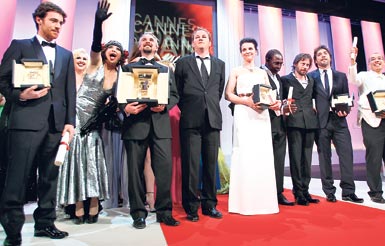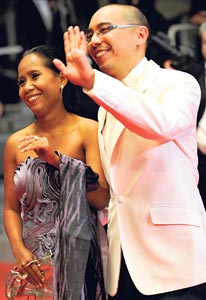CANNES - This year's Cannes Film Festival was marked by a profound contrast between what unfolded along La Croisette, the palm-lined sweep of pedestrian walkway that stretches between swathes of luxury hotels and the azure Mediterranean, and the films debuting onscreen.
Outside all was glitter, excess, posturing, and brand names. Young women in five-inch heels and revealing clothing prowled for wealthy men - or were imported by them to decorate boats and premiere parties. Every night, the parade of stars up the red carpet, flanked by photographers, played out like a relic of a more ritualistic time.
Inside the Palais, the hulking brutalist structure where the films are screened, this year's lineup was filled with tales of ordinary people, or poor people, struggling with the fallout of the global issues that increasingly unite us - or confronting painful political conflicts that official histories had laid to rest. If in the past Cannes showcased films telling a hundred different kinds of stories, this year's offerings made clear that in an increasingly flattened and wired world, there is really only one story - with a hundred different inflections.
 |
| Cannes, FRANCE : (From L) Italian actor Elio Germano, actress Mimi Le Meaux and actress Kitten on the Keys, US director Michael Rowe, French director Xavier Beauvois, French actress Juliette Binoche, Chadian director Mahamat-Saleh Haroun, French director and actor Mathieu Amalric, Spanish actor Javier Bardem and Thai director Apichatpong Weerasethakul pose with their awards during the closing ceremony at the 63rd Cannes Film Festival on May 23, 2010 in Cannes. AFP |
Thai cinema's gifted young director Apichatpong Weerasethakul's film, Uncle Boonmee Who Can Recall His Past Lives, won the Palme d'Or. It is a Spanish-German-French-British-Thai co-production, the kind of international collaborative effort we are increasingly seeing in film -- a form of cross-border collaboration that should point the way to other forms of global civil-society projects.
The film, whose production was slowed by the "red shirt" revolt in Thailand, deals in part with themes of past violence. At one point, the project - which is also part of a massive art installation - refers to the history of a village: local teenagers recount that, "Soldiers once occupied this place. They killed and tortured villagers and forced them to flee to the jungle."
Poetry, by South Korean director Lee Chang-Dong, also deals with a family reconciling themselves through pain to a prior conflict. It tells the story of an elderly woman who is forced to face her past as a torturer.
Other films address a conflict that is closer to home here in France. Outside the Law, directed by Rachid Bouchareb, narrates the story of the massacre at Setif, Algeria, in May 1945. The film tracks the events surrounding three Algerian brothers over a 35-year period, and brings to light aspects of the massacre that had been considered taboo in France.
Strikingly, Outside the Law is a Franco-Algerian production, and it has already caused political controversy: it was denounced by Lionnel Luca, a French deputy who is, as one French periodical put it, "nostalgic for a French Algeria." The film actually sparked a noisy protest along La Croisette, with French veterans defensively and aggressively singing "La Marseillaise," even as couples dressed in black tie and gowns swept in a parallel path to the evening's festivities. In response, the mayor of Cannes organized a ceremony to commemorate all victims of the French-Algerian conflict.
Still another film reawakens not-so-distant American history and casts it in a radically altered light: Doug Liman's Fair Game reinterprets the Valerie Plame/Joe Wilson scandal of 2003, and reveals that Plame was far from being a glorified secretary, as the Bush administration had portrayed her. On the contrary, she led a team that intercepted components of nuclear weapons at their source, whisked them away to the United States, altered them slightly so that they would not work, and replaced them. So the Bush administration's leak of her identity ended not just her career, but also a sensitive programme that had kept us all safe.
 |
| Thai director Apichatpong Weerasethakul and Thai actress Wallapa Mongkolprasert arrive for the screening "Lung Boonmee Raluek Chat" (Uncle Boonmee Who Can Recall His Past Lives) presented in competition at the 63rd Cannes Film Festival on May 21, 2010 in Cannes. AFP |
Other films simply tell stories of people who are not usually portrayed by film. Los Labios, an Argentine project directed by Santiago Loza and Ivan Fund, simply follows three government-funded nurses who go to a rural area to serve the needs of the impoverished local population. It humbly tracks their accounting of cases of malnourishment, alcoholism, diseases of poverty, and the ravages of unemployment and inadequate medical care.
Similarly, Sergei Loznitsa's My Joy simply explores the life of a Ukrainian truck driver named Georgy, who gets lost and finds himself in an archetypal Russian village, where he is drawn into daily life.
This is a real cinema of humility - the directors again and again have chosen to take seriously the dramas and struggles of ordinary people and find the heroism or tragedy therein.
What does it all mean? The many movies that critically revise settled national narratives suggest that people are no longer willing to accept history that has been crafted by elites for their own purposes. In most cases, the directors researched their own films by interviewing sources who were close to the action, or close to the main events at a grassroots level.
That is an exciting development, though initially it implies a messier historical narrative.
In Bouchareb's film, for example, there is not a unified story of the occupation of Algeria, but many points of view that a young French teenager (or French-Algerian teenager) can witness and draw from. That is surely good, especially in an open society.
So is the focus of other films on the struggles of ordinary people. To be sure, simply championing populism for its own sake - a Stalinist or New Left reflex - makes for bad art.
But the flattening of the world has led to a flattening of the kinds of people who can be seen as heroes or seekers. By bringing these subjects into focus, great film directors have gained a larger and more representative world of stories from which to work their magic.
Naomi Wolf is a political activist and social critic whose most recent book is Give Me Liberty: A Handbook for American Revolutionaries.
Copyright: Project Syndicate, 2010. Exclusive to the Sunday Times. |



